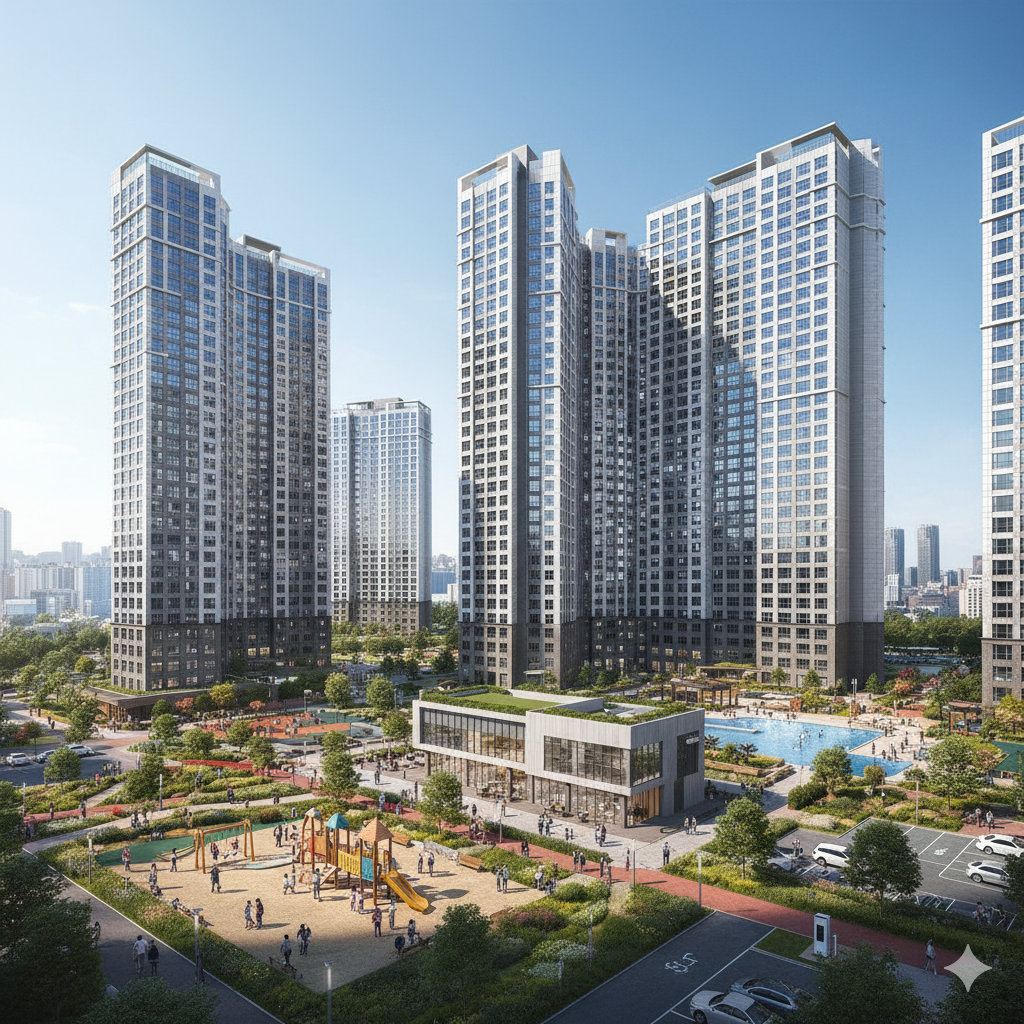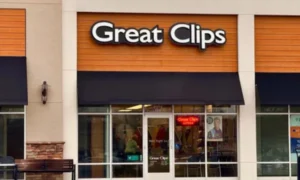APT in Korean means “apateu,” which is the abbreviation for apartment, referring to multi-unit residential buildings commonly found in South Korea. It is used in daily conversation, real estate listings, and media to indicate modern, high-rise living spaces.
If you’ve been exploring Korean culture, K-dramas, or real estate listings in South Korea, you’ve probably seen terms like “APT complex,” “luxury APT,” or “APT for rent/sale.” Understanding APT in Korean is key to navigating housing, urban life, and cultural discussions.
📜 Origins of APT in Korea: From English to Everyday Language
The term APT is derived from the English word apartment, but in Korean, it is pronounced “apateu (아파트).”
1960s–1970s: South Korea experienced rapid urbanization. The government and developers started building modern housing complexes, introducing apartment-style living.
1980s–1990s: The term APT became popular in advertising, newspapers, and media to describe high-rise, modern residential buildings.
Present: APT is widely used in real estate listings, social media, and casual conversation, often synonymous with modern urban housing.
💡 Fun Fact: In Korea, APT complexes often include amenities like gyms, playgrounds, security, and parking, making them highly desirable for families.
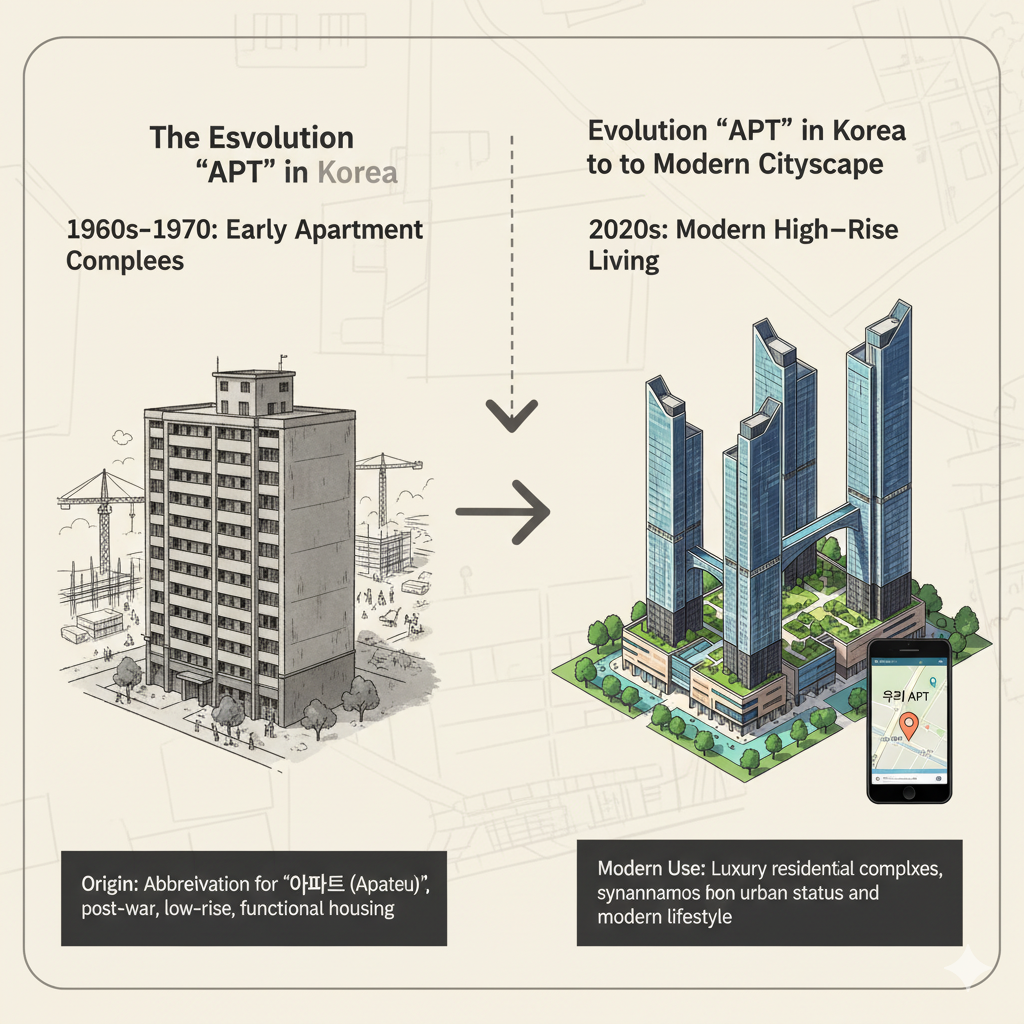
🏢 APT in Modern Korean Housing
In South Korea, APT refers to multi-unit residential buildings that are usually high-rise and managed by housing complexes. Some key characteristics:
High-rise buildings: Most APTs are 10–30+ stories tall.
Modern facilities: Security, elevators, gyms, parking, playgrounds.
Community living: Many APTs are part of large complexes with multiple towers.
Urban convenience: Located in cities like Seoul, Busan, or Incheon.
Example:
- “I just moved into a new APT in Gangnam with great amenities.”
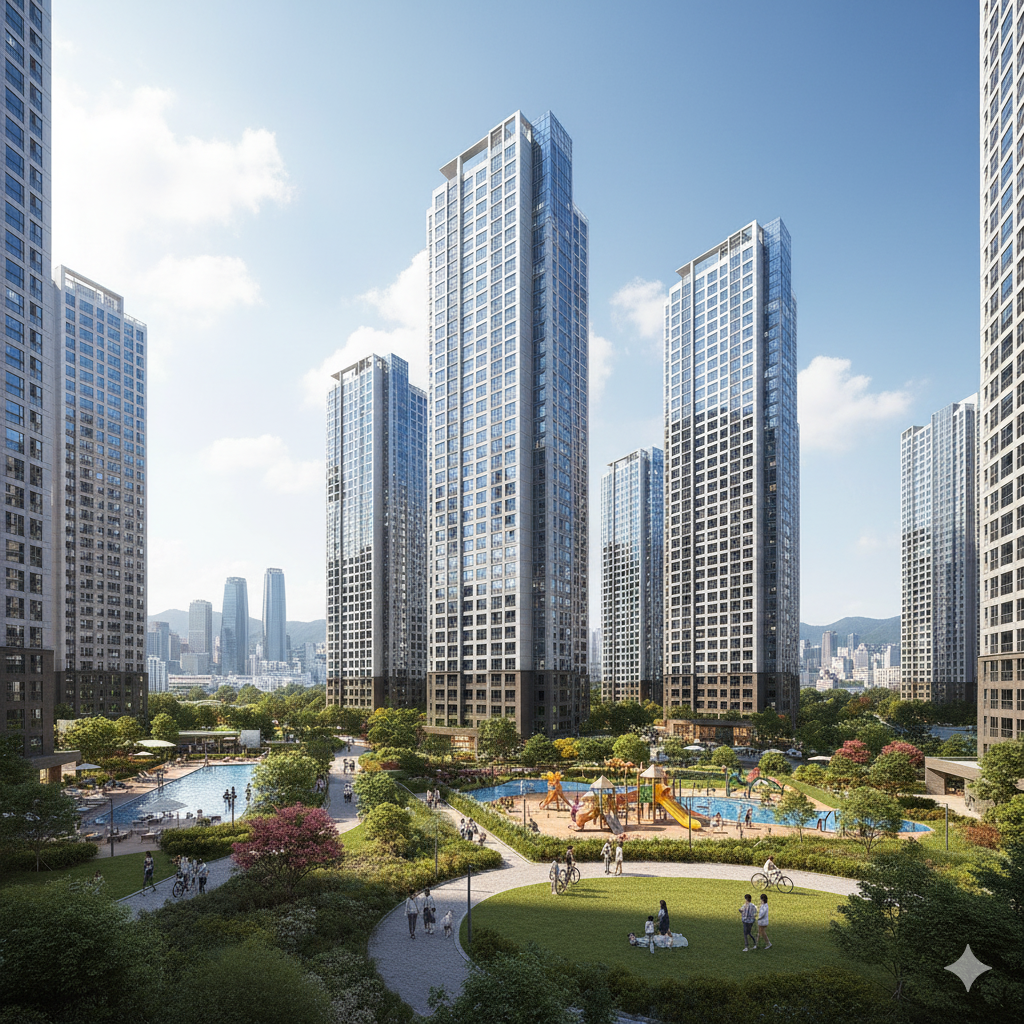
🏘️ APT vs Officetel vs Villas: Comparison Table
| Housing Type | Korean Term | Typical Use | Features | Example |
|---|---|---|---|---|
| APT | 아파트 (apateu) | Urban family residence | High-rise, modern, amenities | Luxury APT in Seoul |
| Officetel | 오피스텔 | Studio apartment + office | Small, multipurpose | 1-room officetel near Gangnam |
| Villa | 빌라 | Low-rise apartment | 2–5 floors, less modern | Residential villa in Busan |
| House | 주택 | Detached house | Private, often older | Traditional Korean home in suburbs |
This table helps foreigners and expats understand differences between Korean housing options.
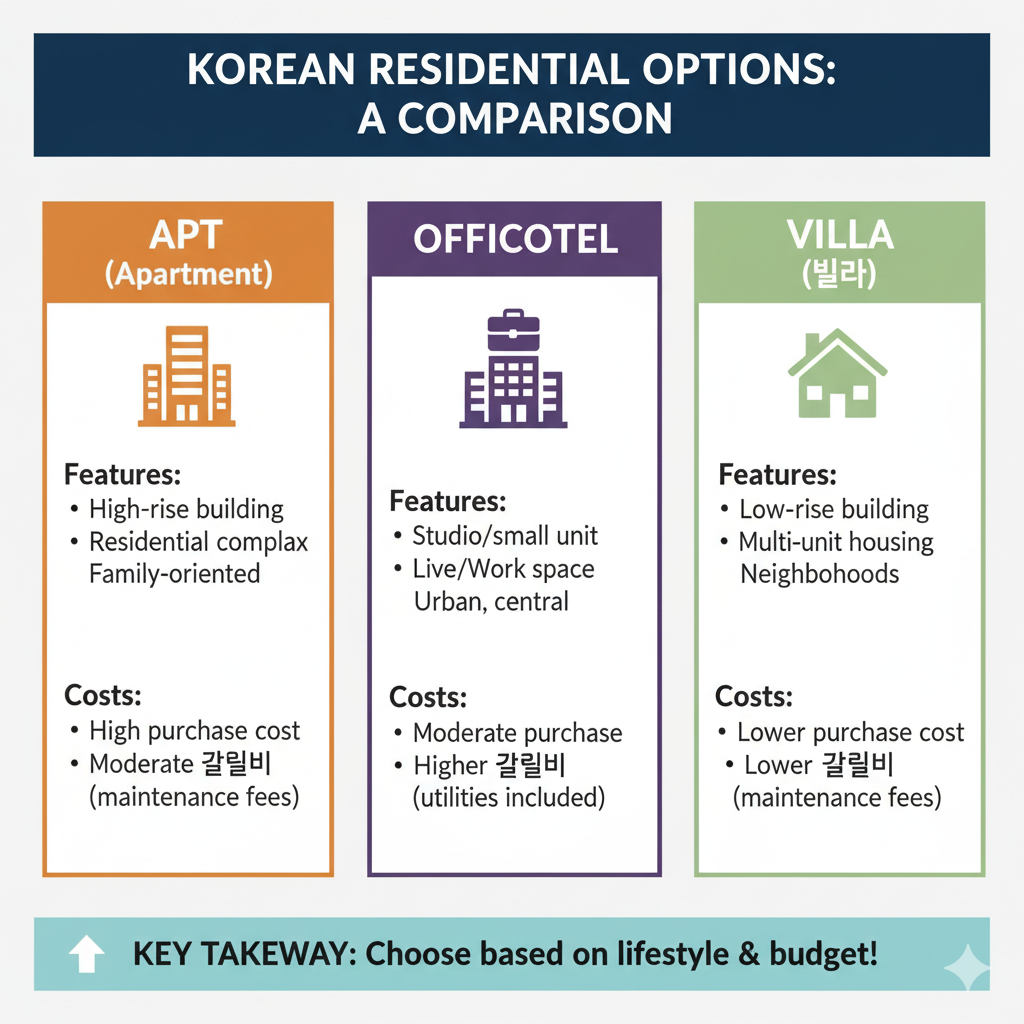
💰 Why APTs Are Popular in Korea
APTs are the preferred choice for urban families due to several reasons:
Modern amenities: Security, elevators, parking, gyms.
Community living: Often include playgrounds, community centers, and shared gardens.
Investment value: High demand makes APTs attractive for buying and renting.
Convenient locations: Near schools, subway stations, and shopping areas.
💡 Tip: In Seoul, living in an APT is often a status symbol, with luxury complexes being highly sought after.
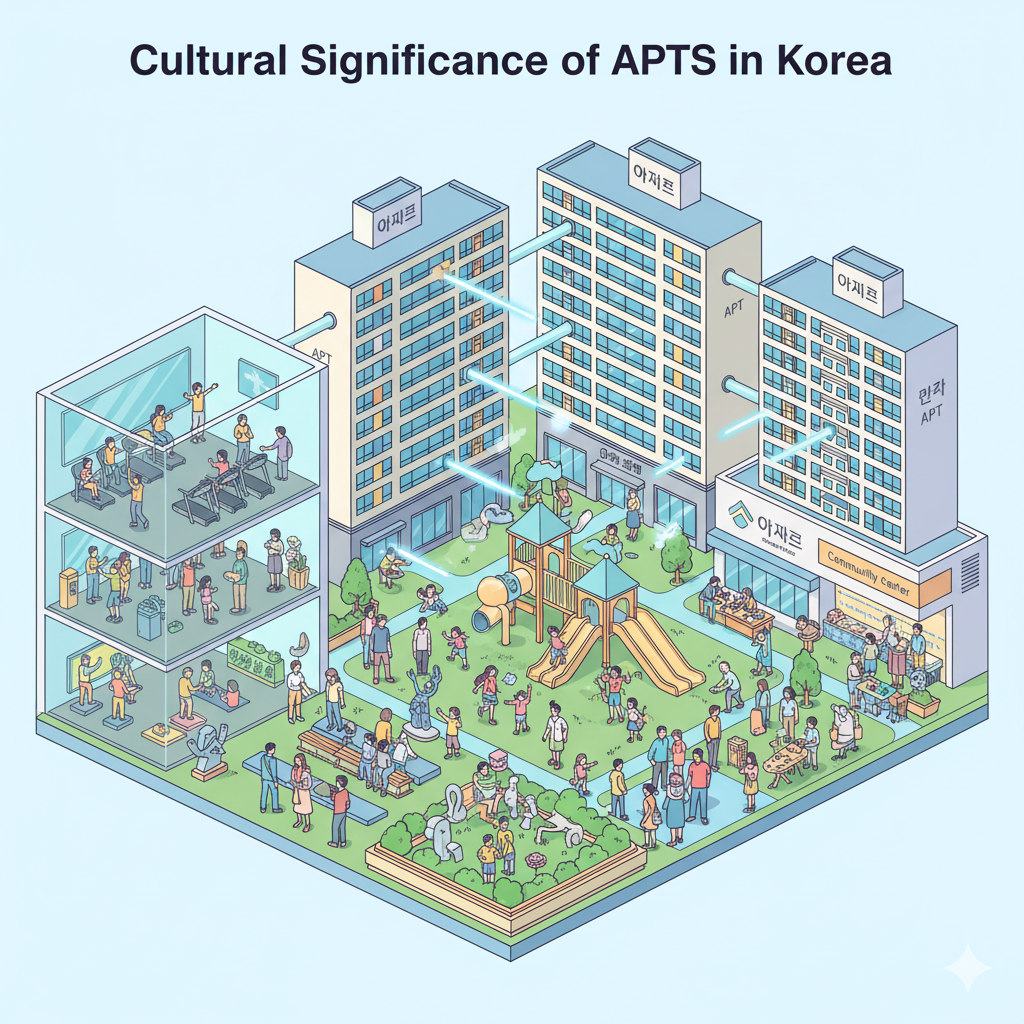
🏗️ How Korean APTs Are Structured
Korean APTs are typically part of a larger complex called “APT complex (아파트 단지).” Each complex may include:
Multiple high-rise towers
Underground parking
Playgrounds and parks
Fitness centers and swimming pools
Community security services
Example:
- “The Lotte World Tower APT complex has 5 towers with over 1,000 units each.”
🌏 Cultural Significance of APTs in Korea
In Korea, APTs are more than just housing—they reflect urban lifestyle and social status:
Status symbol: Certain high-end APTs, like Samsung Tower Palace, are associated with wealth.
Community culture: Residents often form APT committees for management, events, and security.
Media presence: Many K-dramas, K-pop music videos, and films showcase life in APTs.
💡 Fun Fact: Owning an APT in Gangnam is considered prestigious and often mentioned in social contexts.
🏢 Renting vs Buying an APT in Korea
| Option | Features | Pros | Cons | Notes |
|---|---|---|---|---|
| Renting | Monthly rent, often with deposit (Jeonse or Wolse) | Flexible, short-term | High deposit for Jeonse | Popular for expats |
| Buying | Full ownership | Long-term investment, stability | High cost, mortgage | Preferred by families |
| Jeonse | Large deposit, no monthly rent | Avoids monthly payments | Requires huge upfront deposit | Traditional Korean rental |
| Wolse | Monthly rent + smaller deposit | Affordable upfront | Continuous monthly payments | Modern rental option |
🧠 Tips for Living in a Korean APT
Understand rules: Many APT complexes have strict guidelines for noise, pets, and renovation.
Community etiquette: Respect shared spaces like elevators, gyms, and playgrounds.
Security: Most APTs have keycard access and CCTV—important for safety.
Utilities & maintenance: Check maintenance fees (관리비, gwanlibi) which cover shared amenities.
❓ FAQs About APT in Korea
1. What does APT mean in Korean?
APT = 아파트 (apateu), meaning apartment or multi-unit residential building.
2. How is APT different from a villa or officetel?
- APTs are high-rise, modern, and family-friendly, while villas are low-rise and officetels are multipurpose small units.
3. Are APTs expensive in Korea?
- Yes, especially in Seoul and high-demand districts. Luxury APTs can cost millions of dollars.
4. Can foreigners buy APTs in Korea?
- Yes, with proper legal and financial procedures, foreigners can purchase APTs.
5. What amenities are usually included in a Korean APT?
- Security, playgrounds, gyms, parking, community spaces, and sometimes swimming pools.
🏁 Conclusion
APT in Korea means apateu, or apartment, and represents modern urban living with amenities, community, and convenience. Understanding APTs helps expats, travelers, and anyone interested in Korean culture navigate real estate, social norms, and city life effectively.
Whether renting or buying, living in a Korean APT combines comfort, security, and lifestyle benefits, making it a central aspect of urban Korean society.
David is the creative mind behind jokes Crafter, a hub for clever jokes, witty wordplay, and laugh-out-loud content. With a passion for humor and a knack for crafting the perfect punchline, David brings smiles to readers across the globe. When he's not writing, he's probably thinking up his next viral joke or enjoying a good comedy show.
